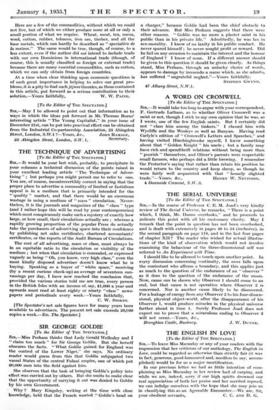THE SERIAL UNIVERSE
[To the Editor of THE SPECTATOR.]
Sm,—In the course of Professor C. E. M. Joad's very kindly review of The Serial Universe, he remarks, " There is a point which, I think, Mr. Dunne overlooks," and he proceeds to indicate this point with all his customary clarity. May I remark that the point in question has not been overlooked, and is dealt with extensively in pages 48 to 54 (inclusive), in the second paragraph on page 118, and in the last four pages of chapter XII ? The reader who wished for actual illustra- tions of the kind of observation which would not involve examining the behaviour of the three-dimensional self was referred to An Experiment with Time.
I should like to be allowed to touch upon another point. In every discussion concerning continuity, the onus falls upon the contestant who affirms a boundary, and this applies just as much to the question of the endurance of an " observer " as it does to the question of the endurance of the moon. Now, cause can be shown why Observer 1 should come to an end, but that cause is not operative where Observer 2 is concerned. Nor is another cause likely to be discovered. For a leakage of energy from any Observer 2 to his four-dimen- sional, physical object-world, after the disappearance of his Observer 1, would produce miracles in the physical universe farther ahead in time 1. Surely Professor Joad does not expect me to prove that a miraculous ending to Observer 2 will not occur.—Yours, &c.,






































 Previous page
Previous page